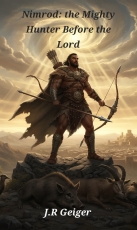
Book by: J.R. Geiger
Genre: Non-Fiction
The quiet, righteous life established in Erech and the cities of Assyria could not shield them forever. Even the rugged northern mountains were not high enough to escape the reach of human pride. As Nimrod settled into the governance of Nineveh, consolidating his vast and faithful northern kingdom, tales of Babel began to sweep across the ancient world.
These were no longer whispers of vanity; they were boasts of a grand, world-changing structure. The builders, driven by fear of judgment and desire for fame, had committed entirely to the construction of their heavenly monument. “Then they said, ‘Come, let us build ourselves a city and a tower with its top in the heavens, and let us make a name for ourselves’” (Genesis 11:4).
The Gospel of Pride
The rulers who had replaced Nimrod in Babel sent emissaries across the lands, delivering a new gospel of human power. Their message was seductive: “Join us… help us finish the Tower to Heaven! No force, natural or divine, can scatter us again.”
Many settlers felt the pull of this promise. Why endure hardship when a fortress promised eternal ease? Yet “Pride goes before destruction, and a haughty spirit before a fall” (Proverbs 16:18).
Nimrod’s Final Warning
Nimrod, now King of Assyria, saw the fatal lure. He would not send an army, for he would not crush conscience. “For freedom Christ has set us free; stand firm therefore, and do not submit again to a yoke of slavery” (Galatians 5:1).
Instead, he chose truth. Traveling south, he spoke with urgency:
“Do you not remember the lesson of the waters? The Tower is not a shield against God, it is an insult to His grace! We are commanded to fill the earth, not to gather in fear. Do not trade the promise of the rainbow for a few more feet of brick!”
“Do not be deceived: God is not mocked” (Galatians 6:7).
His words were honored in Erech, but dismissed in Shinar. The tide of ambition was too strong.
The Watchman’s Prayer
With a heavy heart, Nimrod and the faithful made camp on a high bluff overlooking Shinar. Below, the tower’s base scarred the earth. This became their watch post and altar.
They did not fight; they bore witness. They prayed—not for fire or flood, but for hearts to turn. “I urge that supplications, prayers, intercessions, and thanksgivings be made for all people” (1 Timothy 2:1).
They prayed for the covenant, that the Lord would remember Noah and the righteous among the scattered tribes. “The prayer of a righteous person is powerful and effective” (James 5:16).
Positioned on the edge of disaster, Nimrod and his companions became the last remnant of obedience, awaiting the moment when human arrogance would finally meet divine response.
© Copyright 2026 J.R. Geiger. All rights reserved.
Regular reviews are a general comments about the work read. Provide comments on plot, character development, description, etc.
In-line reviews allow you to provide in-context comments to what you have read. You can comment on grammar, word usage, plot, characters, etc.
Great storytelling. I can see the catastrophy coming soon and Nimrod I think sees it as well. He has done his best to disuade and explain things to people. We in the horse world have a saying "you can lead a human to knowledge but you can't make them think" and This seems to be what's happening here.
Morag Higgins